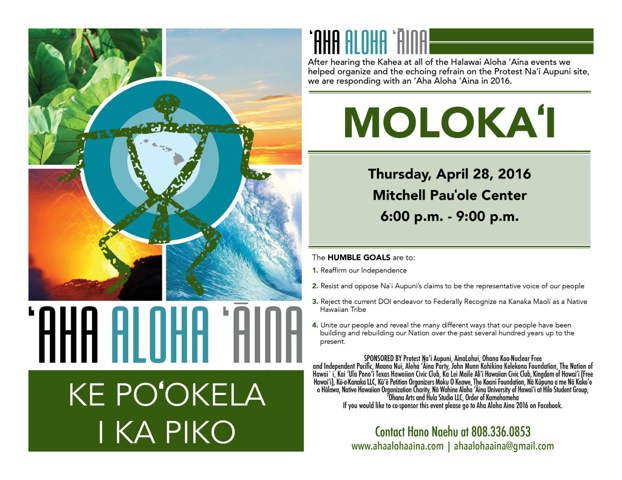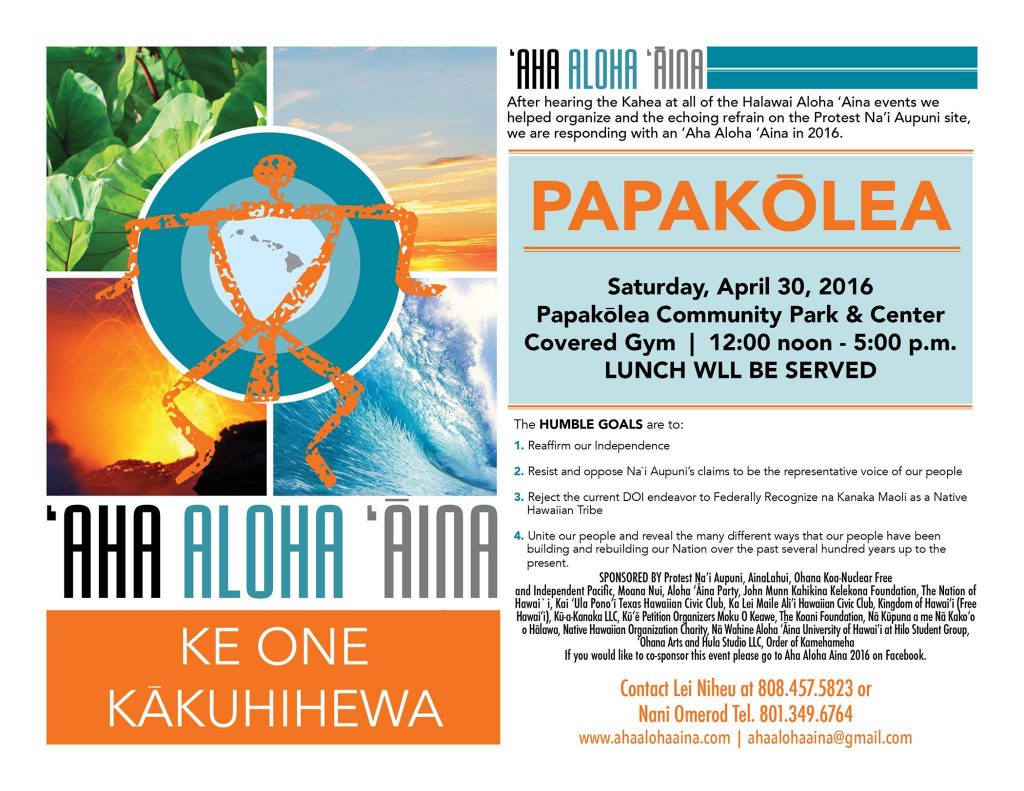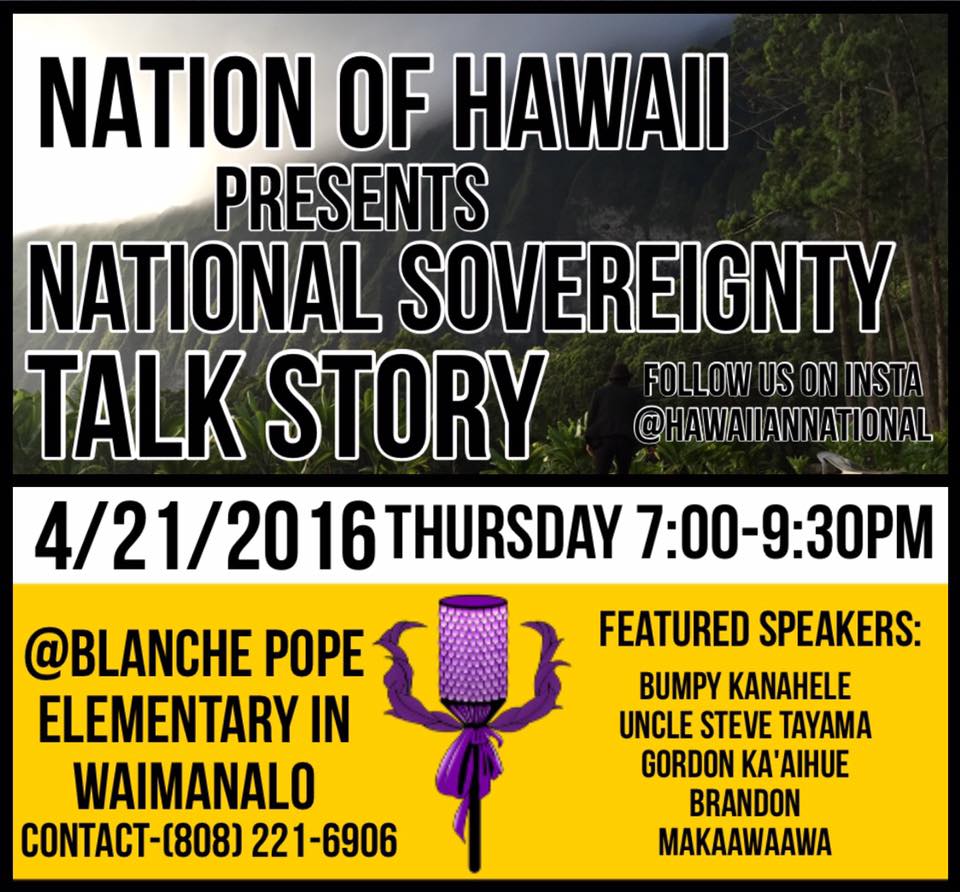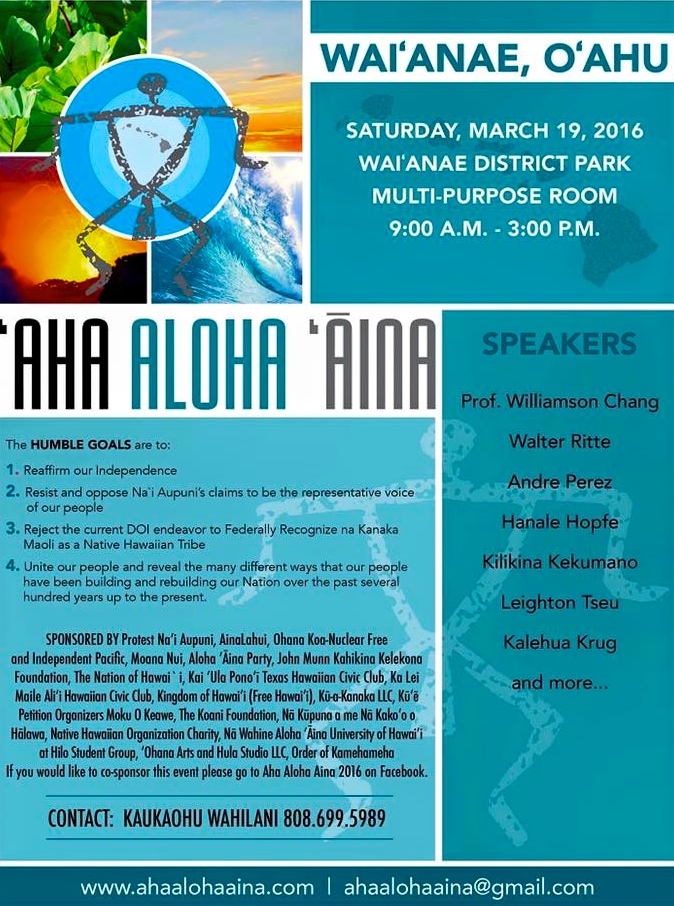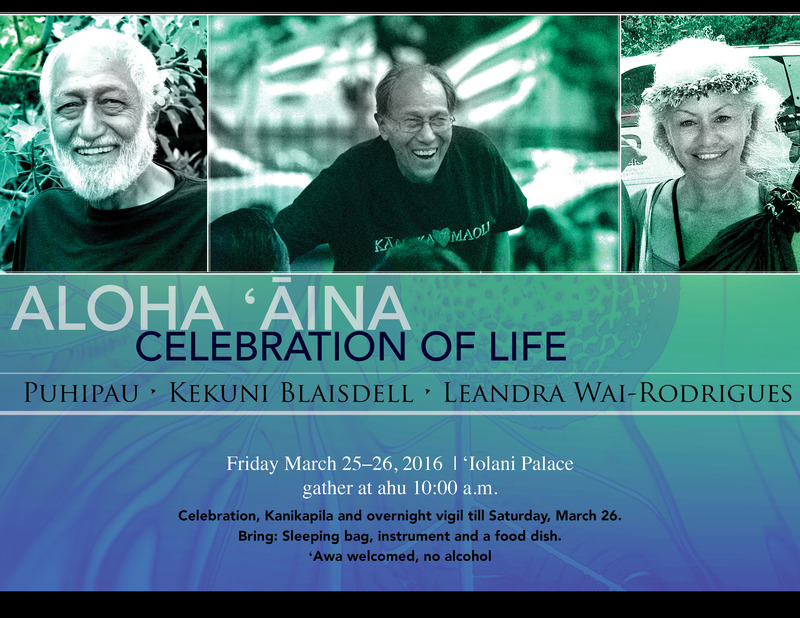This blog is about Hawaii's status as an independent country under prolonged illegal occupation by the United States, and the history, culture, law & politics of the islands.
By Scott Crawford, Hana, Maui
|
Blogs.com Top 10
Hawaii Blogs |
|
Ho’oulu Lahui
“to cause to grow; to be possessed by infinite excellence”
We are honored to gather with Pono Shim, Ramsay Taum, Uncle Bruce Keaulani, Kehaulani Lum, Thao Le, Manu Meyer, Moon Kauakahi, and others who will share their mana`o in talk story format, to stir within you the meaning of aloha, which will allow you to understand and act from a place that is hard to define in words, but will translate into aloha responses in many ways.
When
Wednesday May 18, 2016 from 9:00 AM to 4:30 PM
Registration opens at 8:15 AM HST
Where
Hawaii Convention Center
1801 Kalakaua Avenue
Honolulu, HI 96815
Sponsored by State of Hawaii, Department of Human Services, Office of Youth Services
More information…
From Hawaii News Now:
Former Governors John Waihee and Ben Cayetano did a great service to all of us by agreeing to talk about their disagreements over the Hawaiian Sovereignty movement. We hope their honest, civil and articulate conversation will encourage similar discussions across our community.
We aired a half-hour version of their discussion last week – called the Sovereignty Divide. That show is now posted on our website, HawaiiNewsNow.com. We are also planning to rebroadcast it again in the near future.
For far too long, many of us have kept arm’s length from the sovereignty process. Not only is it complex and emotional, but for non-Hawaiians it is easy to say that we are simply not involved.
But Hawaiian Sovereignty will affect the entire community, and as both Governors agreed, the entire community should be informed and educated, even if we are not invited to vote.
We hope our contribution – regular reporting and this special program – will help. But if we are to succeed moving forward, we must all be engaged, listening and talking together about this important issue.
Go here to watch the video…
I posted the first two installments of this series from the Hawaii Independent, but are all 5 parts.
As one of the 154 kānaka maoli who agreed to participate in the state-sponsored, Naʻi Aupuni-initiated Native Hawaiian ʻAha, Kaʻiulani Milham had a front row seat at the month-long proceedings. What follows a multi-part, first-hand account that highlights various and consistent affronts to democratic processes that ruled during the ʻAha proceedings.
Part I
Part II
Part III
Part IV
Part V
“A POWER IN THE WORLD”:
THE HAWAIIAN KINGDOM AS A MODEL OF HYBRID STATECRAFT IN OCEANIA AND A PROGENITOR OF PAN-OCEANIANISM
By Lorenz Gonschor
Political Science
In the nineteenth century, the Hawaiian Kingdom became the first, and for a long time only, non- Western state to achieve full recognition as a co-equal of the Western powers. Technologically at the cutting edge of modernity but at the same time grounded in aboriginal tradition and identity, the Kingdom was an archetypical example of a hybrid state. While knowledge of this has been all but erased due to the on-going occupation of Hawai‘i by the United States, it has recently resurfaced thanks to the work of various Hawaiian scholars. Most remarkable, the Kingdom’s leaders, including monarchs, government officials and diplomats, used their country’s secured political status to promote the building of independent states on its model throughout the Pacific Islands, and envisioned a unified Oceania. Such a pan-Oceanian polity would be able to withstand foreign colonialism and be, in the words of one of the idea’s pioneers “a Power in the World.” While the islands of Oceania did eventually succumb to colonialism, and the Hawaiian Kingdom itself was invaded and occupied, the legacy of this visionary policy can be seen in many aspects of Oceania today and can serve today as an inspiration and guideline for envisioning de-colonial futures for the Pacific region. Within this context, the dissertation examines and analyses two intertwined processes: First, the evolution of the Hawaiian Kingdom from its classical predecessors to the exemplary hybrid state in Oceania and the dissemination and institutional transfer of this model to other Pacific archipelagos; and secondly, the development of a Hawai‘i-based pan-Oceanianist policy and underlying ideology, which provided the rationale for the spread of the Hawaiian political model to be actively promoted by the Kingdom’s government. This historical narrative is put in perspective of the pan-Oceanianist writings of Epeli Hau‘ofa, current political moves towards more assertive Oceanian regionalism and the movement to de-occupy the Hawaiian Kingdom.
Monday, April 4, 2016
2pm to 4pm
Saunders 704
Department of Political Science, University of Hawaiʻi at Mānoa
2424 Maile Way, Saunders 640, Honolulu, HI 96822-2223
Press release from Na’i Aupuni:
NAʻI AUPUNI DECIDES NOT TO PURSUE RATIFICATION VOTE
Education and Ratification of Native Hawaiian Constitution Best Pursued by Broad-based Group
HONOLULU – Naʻi Aupuni said today it would not be conducting a ratification vote on the proposed constitution produced by the recently completed ‘aha. It believes that the ‘aha participants, who represent a diverse and multigenerational cross section of the Native Hawaiian leaders from Hawaii, the North American Continent, Asia and Europe, or a similarly broad-based group, would be the entity to best advance the ratification vote and conduct the important process of educating our communities about the constitution.
Continue reading Na’i Aupuni will not pursue ratification vote
|
|


